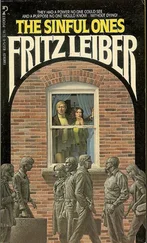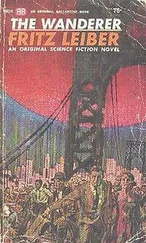As Damon Knight noted, I wrote “The Night He Cried” because I was distantly angry at Mickey Spillane for the self-satisfied violence and loveless sex and anti-feminism he was introducing into detective fiction and because he had the temerity to publish a couple of stories in the fantasy field, about which I have a parental concern. My rage seems remote now, yet the point was valid.
“The Big Trek” got me a gorgeous magazine-cover illustration by Emsh. Like “Foxholes,” it was first written with a modern setting and sold only when I gave it a colorful futurian one.
“Space-Time for Springers” was my first story about the self-sufficient and subtle aristocrats of the animal world. Frederik Pohl wrote of it extravagantly, “Fritz Leiber was not born with a caul-believe it if you can! For his greatest gift is the knack of second sight, the talent that sees beneath the outer garments of flesh and blood into the heart of things, and people—and of cats.”
“Try and Change the Past” was my first short story in the Change-War or Big-Time series. The novel The Big Time, published simultaneously, went on to win me my first Hugo.
The novelette “A Deskful of Girls” got me another colorful magazine cover, this one by Kelly Freas.
The story is about the sexual hangups and love goddesses of the 1950s, written for fun and chills.
“Rump-Titty-Titty-Tum-Tah-Tee” takes a humorous look at arty intellectuals and advertisers. Anthony Boucher remarked of it, “An editor finds himself fascinated and a little frightened when he publishes a story which evokes such disproportionately intense response as to make it obvious that the author has unconsciously hit upon some basic and deeply communicative symbol.”
“Little Old Miss Macbeth” caused Robert P. Mills, then editor of Fantasy and Science Fiction, to observe, “Surely Fritz Leiber is the most vividly visual of all science-fantasy writers.” This seems extreme, yet for me vision is “worth all the rest” of the senses, as Macbeth put it. It may be due to my youth as an actor and the child of actors. I
visualize most of my stories and set many of them on an imaginary stage. Some, like The Big Time, have only one set.
“Mariana” was another story that seemed to write itself—a gift from the goddesses after I had unremittingly toiled word by word through four tales for the all-Leiber issue of the magazine Fantastic, the last one of which hung me up so that the only way I could finish it was to write it backwards from the end to the middle, scene by laborious scene. “Mariana” was selected by Judith Merril for The Year’s Best SF .
So was “The Man Who Made Friends With Electricity,” a supernatural horror story stemming from the California environment of my last decade and a half. Before that, Chicago was my place.
“The Good New Days” looks at the Beat Generation and our slum planet, but aims at entertainment first.
“America the Beautiful” might be thought of as “Coming Attraction” revisited. Another Britisher encounters a different, but equally disturbing future America. Low-key and heavy on the atmosphere, but as always I’ve tried to make the story the thing.
So there you have them, the best of my science-fantasy stories, fa my estimation. Three from the 1940s, no less than fourteen from the 1950s, four from the 1960s, one from the 1970s. 1958 was my peak year
by this numerical and egocentric criterion, with five stories. 195Q was second, with three, while 1951 and 1952 had two apiece. I seem to have had four chief bursts of creativity, triggered off by the Second World War, the nuclear bomb, the sputniks, and the war in Vietnam. I’m glad I’ve been able to react to those dreadful stimuli with laughter as well as fears. Edmund Cooper wrote in The Sunday Times of London, “Fritz Leiber has a wicked imagination. Wicked enough to make us laugh at an impossible future containing nightmarish aspects of our own times.”
So, as I say, there you have them, the best of my science-fantasy stories. But I hope to write better ones. I’ll never stop writing. It’s one occupation in which being crazy, even senile, might help.
—FRITZ LEIBER
In The Magazine of Fantasy and Science Fiction for July 1969, a special issue honoring Fritz Leiber. Previously, in November 1959, Fantastic had run an all-Leiber issue. These, and the awards voted him, indicate the esteem in which his work is held by those who know the field.









